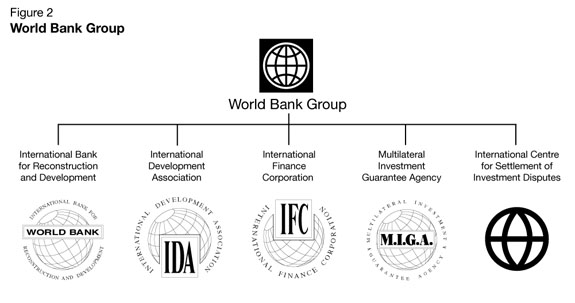Canada’s Finance Minister recently tabled these two annual reports:
- Canada at the IMF and World Bank Group 2010—Report on Operations Under the Bretton Woods and Related Agreements Act
- Canada at the European Bank for Reconstruction and Development 2010—Report on Operations Under the European Bank for Reconstruction and Development Agreement Act
The Bretton Woods Institutions are the World Bank, and the International Monetary Fund (IMF). They were set up at a meeting of 43 countries in Bretton Woods, New Hampshire, USA in July 1944.
The above IMF/World Bank and EBRD Annual Reports documented Canada’s significant contributions in strengthening the following key international financial institution that countries in need turn to during a crisis such as the unprecedented economic downturn :
As a host of international meetings, Canada demonstrated its leadership in the global actions taken to ensure a solid economic recovery as well as a “commitment to the international financial institutions on the front lines in efforts to build a truly sustainable global recovery.”
Interestingly, Canada is a founding member and the eighth largest shareholder of the EBRD, and the Minister of Finance is Canada’s Governor on the EBRD’s Board of Governors.
Here are Canada’s good deeds in making these international financial institutions more effective:
- $840 million in resources to the IMF’s Poverty Reduction and Growth Trust to encourage increased concessional lending tailored to the specific needs of low-income countries;
- A Canadian-led effort to forgive over $825 million that Haiti owed to international institutions;
- $291 million in support for a number of climate change projects through the World Bank’s International Finance Corporation (IFC); and
- $600 million in increased funding over three years for agricultural development, including $230 million for the World Bank Group–led Global Agriculture and Food Security Program.
For the past three years Canada’s three overarching priorities for the Bretton Woods Institutions are:
- governance and accountability,
- institutional effectiveness, and
- sustainable poverty reduction and growth.

Department of Finance Canada
News Release
Ottawa, March 25, 2011
2011-031
Canada’s Leadership in the Spotlight in IMF/World Bank and EBRD Annual Reports
Related Documents:
- Canada at the IMF and World Bank Group 2010—Report on Operations Under the Bretton Woods and Related Agreements Act
- Canada at the European Bank for Reconstruction and Development 2010—Report on Operations Under the European Bank for Reconstruction and Development Agreement Act
The Honourable Jim Flaherty, Minister of Finance, today tabled two reports highlighting Canada’s significant contributions in strengthening key international financial institutions: Canada at the IMF and World Bank Group 2010—Report on Operations Under the Bretton Woods and Related Agreements Act and Canada at the European Bank for Reconstruction and Development 2010—Report on Operations Under the European Bank for Reconstruction and Development Agreement Act.
“Canada had a historic year in 2010, hosting important international meetings and playing a pivotal role in the global actions taken to ensure a solid recovery after an unprecedented economic downturn,” said Minister Flaherty. “Part of these endeavours included strengthening the institutions countries in need turn to during a crisis, such as the International Monetary Fund (IMF), the World Bank Group and the European Bank for Reconstruction and Development (EBRD). The milestones contained in these reports offer a further testament to a remarkable year, and a demonstration of Canada’s commitment to the international financial institutions on the front lines in efforts to build a truly sustainable global recovery.”
Canada at the IMF and World Bank Group summarizes Canada’s contributions to the two Bretton Woods institutions and Canada’s IMF and World Bank priorities: improving their governance and accountability, encouraging them to deliver on their core mandates as effectively as possible, and supporting their efforts to ensure the global growth and stability they foster will have a lasting impact. Canada is the ninth largest shareholder at the IMF and the seventh largest at the World Bank, and the Minister of Finance is Canada’s Governor on the Board of Governors of both institutions.
Canada at the European Bank for Reconstruction and Development provides a detailed account of Canada’s role at the EBRD and the EBRD’s key role in supporting its countries of operations, which were some of the hardest hit by the recent global financial crisis. Canada continues to focus on three objectives at the EBRD: ensuring institutional effectiveness, promoting good governance and accountability, and encouraging environmental sustainability and gender equality. Canada is a founding member and the eighth largest shareholder of the EBRD, and the Minister of Finance is Canada’s Governor on the EBRD’s Board of Governors.
In tabling these reports, Minister Flaherty also noted a number of recent Canadian achievements in making these international financial institutions more effective:
- $840 million in resources to the IMF’s Poverty Reduction and Growth Trust to encourage increased concessional lending tailored to the specific needs of low-income countries;
- A Canadian-led effort to forgive over $825 million that Haiti owed to international institutions;
- $291 million in support for a number of climate change projects through the World Bank’s International Finance Corporation (IFC); and
- $600 million in increased funding over three years for agricultural development, including $230 million for the World Bank Group–led Global Agriculture and Food Security Program.
